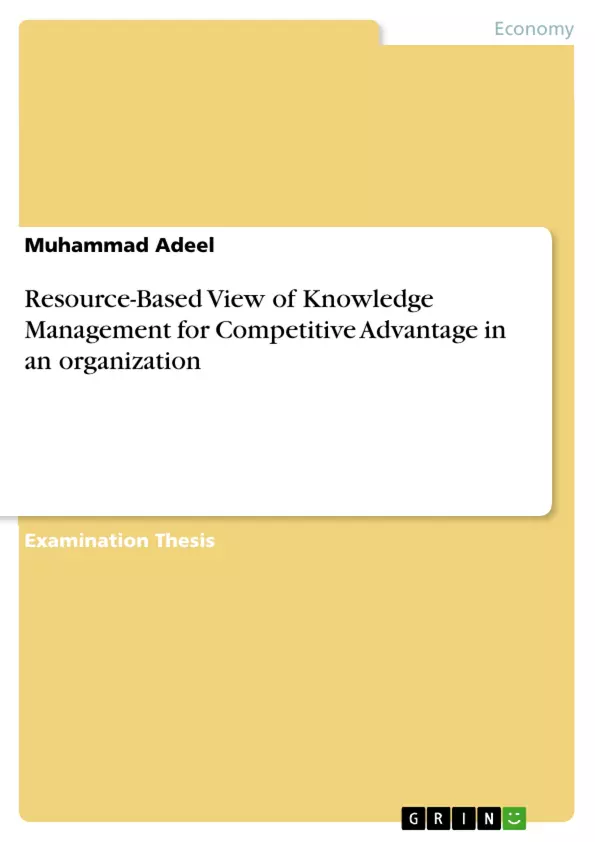We are living in the Knowledge era, a new age which is presumably to have a different perspective or point of view and which will involve a new route for doing businesses. Smart and speedy is vital to the success of organizations in increasingly changing set of the knowledge age. The expansion and practice of KM (knowledge management) is dramatically and continuously growing in firms.
For reason of development in knowledge management, the speed for acquiring a competitive advantage by means of knowledge grows at faster rate as compared to the past. KM has also been demonstrated for its prospective contribution in creating SCA (sustained competitive advantages) for firms. The accusation that knowledge management might be able to generate SCA (sustained competitive advantage) for organizations is provoking; working in this field is relatively underdeveloped, both theoretically and empirically. The recent studies on competitive advantage and knowledge management have stressed description, rather than empirical research knowledge management could achieve to such an advantage.
A possible or potential infrastructure for expanding the conceptual analysis of knowledge management’s impacts on firm's CA (competitive advantage) is the RBV (resource-based view) of the organization which relates the CA of firms with capabilities and resources that are difficult to imitate and firm-specific. The RBV is recently the commanding theoretical view in strategic management published literature, and it concerns with expensive attributes of an organization which are viewed as the basic pillars of SA (competitive advantage).
In RBV (resource-based view), knowledge is viewed as a strategic benefit or asset with the outcome potential to be a source of SCA (sustainable competitive advantage) for a company. The RBV of the organization extends and builds upon the resource-based theory of the organization. It originally developed by Penrose (1959) and enlarged by others (Alavi and Leidner 2001). It encircles the aspects and features to knowledge combination or integration and the four initial method by which knowledge is arranged.
Inhaltsverzeichnis (Table of Contents)
- Introduction
- Problem statement
- Purpose statement
- Research Questions
- Literature review
- Knowledge Management (KM)
- OKMS (Organizational knowledge management systems)
- RBV view of the firm (Resource-based view)
- KM (Knowledge Management) in practice
- The RBV (resource-based) model of Knowledge Management for competitive advantage
- Discussion and Analysis
- Conclusion and Recommendations
- Reference List
Zielsetzung und Themenschwerpunkte (Objectives and Key Themes)
This research paper explores the relationship between knowledge management capabilities and a firm's competitive advantage. Specifically, it investigates how knowledge management systems (KMS) contribute to sustained competitive advantage (SCA) within the framework of the resource-based view (RBV) of the organization.
- The importance of knowledge management in today's dynamic business environment.
- The resource-based view (RBV) as a theoretical foundation for understanding knowledge management's impact on competitive advantage.
- The role of organizational knowledge management systems (OKMS) in creating and sustaining competitive advantage.
- The applicability of knowledge management models in emerging economies.
- The relationship between knowledge management capabilities and sustained competitive advantage (SCA).
Zusammenfassung der Kapitel (Chapter Summaries)
- Introduction: This chapter sets the stage by outlining the significance of knowledge management in the modern knowledge era. It highlights the need for organizations to leverage knowledge for achieving competitive advantage and emphasizes the potential of knowledge management to create sustained competitive advantage.
- Problem statement: This chapter identifies the gap in existing research on knowledge management and competitive advantage. It emphasizes the need for empirical studies to determine the relationship between knowledge management infrastructure and competitive advantage, particularly in the context of emerging economies.
- Purpose statement: This chapter articulates the research objectives. It aims to develop a model that identifies the conditions under which knowledge management can be a source of competitive advantage, drawing upon the resource-based view of the firm.
- Research Questions: This chapter presents the central research questions guiding the study. It explores the relationship between KMS and competitive advantage, seeking to understand the nature of their connection.
- Literature review: This chapter provides a comprehensive overview of relevant literature on knowledge management, OKMS, the RBV, and the role of knowledge management in practice. It discusses the types of knowledge (explicit and tacit) and their role in organizational learning and performance.
Schlüsselwörter (Keywords)
This research focuses on the concepts of knowledge management, competitive advantage, resource-based view, organizational knowledge management systems, sustained competitive advantage, emerging economies, and empirical research.
Frequently Asked Questions
What is the Resource-Based View (RBV) in Knowledge Management?
The RBV is a theoretical framework that links a firm's competitive advantage to its unique, difficult-to-imitate resources and capabilities, such as knowledge.
How does Knowledge Management (KM) create a sustained competitive advantage (SCA)?
KM creates SCA by integrating explicit and tacit knowledge into organizational systems that are specific to the firm and hard for competitors to replicate.
What is the difference between explicit and tacit knowledge?
Explicit knowledge is codified and easily shared, while tacit knowledge is personal, context-specific, and harder to formalize, both being vital for organizational learning.
Why is KM particularly important in emerging economies?
The research highlights a gap in empirical studies in emerging economies, where leveraging knowledge infrastructure is key to competing in a dynamic global market.
What are Organizational Knowledge Management Systems (OKMS)?
OKMS are the infrastructure and processes an organization uses to capture, store, and distribute knowledge to improve performance and innovation.
- Citation du texte
- Muhammad Adeel (Auteur), 2016, Resource-Based View of Knowledge Management for Competitive Advantage in an organization, Munich, GRIN Verlag, https://www.grin.com/document/354209



